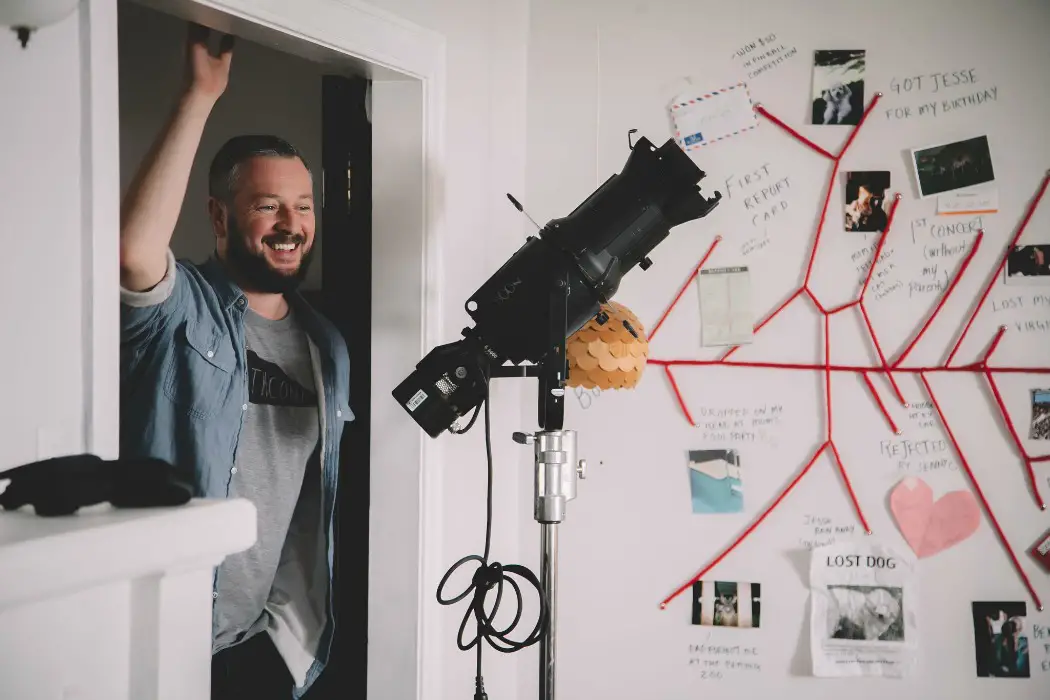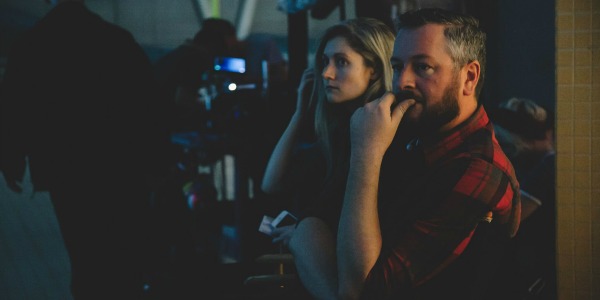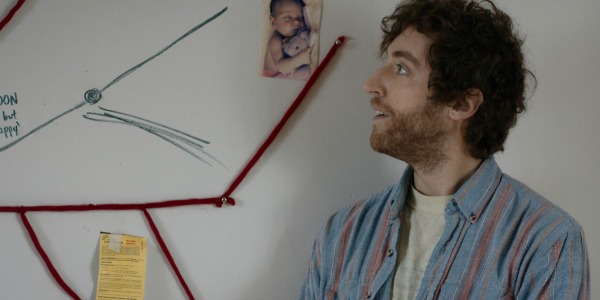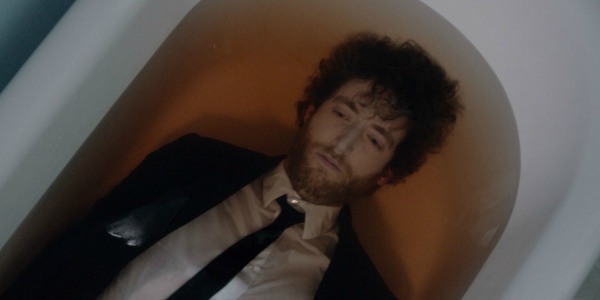Interview With Jason James, Director Of ENTANGLEMENT

Alex Arabian is a freelance film journalist and filmmaker. His…
Perhaps best known for his work as an accomplished producer, Jason James, frequent collaborator of comedic actor Tyler Labine in Fathers & Sons, Mountain Men, and his directorial debut, That Burning Feeling, which won Best Canadian First Feature at the Vancouver International Film Festival, enjoys making films that blend comedy and drama. He prefers to be involved in films that aren’t black and white in their genre or categorization, films that more realistically reflect everyday life. And he’s quite good at translating projects on paper to screen. In his second feature film, Entanglement, James explores a sub-genre that perhaps he’s most passionate about: magical realism.
Throughout Entanglement, there’s comedy, there’s drama, and, yes, there’s a healthy dose of Eternal Sunshine-esque magical realism. Recently, I caught up with James to discuss the making of Entanglement. During our conversation, we spoke about what drew him to the script, both creatively and personally, his influences, the joy of working with screenwriter Jason Filiatrault and the talented cast including Thomas Middleditch and Jess Weixler, his process as a filmmaker, bringing a low-budget film like Entanglement to such vivid life, and what projects he’s working on next.

Alex Arabian for Film Inquiry: Congratulations on an amazing film, Entanglement.
Jason James: Thank you. I read the review that you did earlier. I felt like you understood the film better than I did. You know, it was a really beautiful connection to it, I think. I felt like that was really amazing.
Oh, thank you so much. Yeah, I really connected with it for sure. It was one my favorite films I’ve seen of late.
Jason James: Cool! Awesome. Thanks, man, I appreciate that.
Of course.
Jason James: Did you see it at a festival or did you just get a press screener sent to you?
I was fortunate enough to have a press screener, but it would’ve been awesome to see it at a festival.
Jason James: [Laughs] Well, it’s gonna be in theaters February 9th. What city are you in?
Can’t wait. I’m in San Francisco, so I’m hoping that makes it here. You’ve had wonderful success with a recent trend of comedy-dramas, or dramedies, if you will, continued by Entanglement, your second feature.
Jason James: Yeah.
And so, what attracted you to this script in particular?
Jason James: A lot of things. Like you said, I really love films that kind of oscillate between drama and comedy. Billy Wilder is the biggest hero of mine and the film had a kind of The Apartment-esque kind of quality to it, where you have pure dramatic moments that are undercut by comedy. But beyond that, like when I read the script, as a director, I think a lot about point of view or perspective, and because of Ben’s particular psychosis, you have a lot of freedom with the camera lens and perspective to play in terms of focal length, shifts, and visual effects and camera techniques. And it’s a really visceral world we kind of play in, so, that was something that also really excited me.
And then, beyond that, when the script came across my desk, my mother had just recently told me who my real father was – and I never grew up with a father – and that idea of who we are, where we come from, was kind of similar to Ben’s journey. And I guess I really responded to that emotionally and thought that was a really exciting place for a character to kind of jump from.
And, yeah, those are all things that kind of really connected me to the material to the point where as soon as I put the script down, I created a tumblr site of images and sounds and music and video of how I would execute the film. And I’ve never pitched a writer so hard to let me come on board a project. It’s not often that really unique material comes to you in that way, and so it was something that I really jumped on board to be a part of.
Wow. That’s awesome. That’s incredible.
Jason James: Yeah. [Laughs]
From what I gather, you’re a fan of magical realism, obviously comedy, and sci-fi.
Jason James: Yeah, for sure.
You mentioned Billy Wilder, but are there some others who are your cinematic influences and beyond, films or people?
Jason James: I’ve always been a fan of magical realism in film, Eternal Sunshine [Of The Spotless Mind], or Amélie, or even like Groundhog Day…or Beasts of the Southern Wild, and to me, they always felt like other people’s films, or bigger budget type of films that I would never get to make. And when I saw the script and sort of started to envision it, I got really excited about that, the magical realist aspect of it and how it could be a lower budgeted movie.
You know, I live in Vancouver and I make films in Vancouver, and we have a lot of visual effects companies here and it was really tight. I decided to just date all of them. So I’d take them out for coffee and just talk about this film, and a lot of these companies, they work on Neill Blomkamp films, they work on Star Wars, their whole job is to make the unreal seem real. They’re trying to make aliens and spaceships and explosions and make them feel like they’re in the real world. So, this movie, I wanted the visual effects to feel unreal. I wanted them to feel kind of crappy and handmade and bump up against the real world.
So, it was like really trying to get these companies to come around and they were sort of a little bit confused of what I was trying to do. And I think what this film, in terms of its influences, because so much of the film is from Ben’s perspective or point-of-view, I was really trying to tap in these collective consciousness of images and ideas – things that felt familiar to all of us – so, the claymation deer, sort of feels like that 1950s or 1960s Rudolph The Red-Nosed Reindeer.
Yeah.
Jason James: You know, the fireworks in the sky feel like shitty Windows 95 screensavers. And the execution and the images and the ideas – I just wanted it to feel very familiar to all of us in terms of these images.
Yeah, yeah, I totally get that. One thing that stood out, of the many, is that Thomas Middleditch and Jess Weixler have such magnetic onscreen chemistry. Did you have an idea of who you wanted to play the leads early on in development, or did that sort of come naturally later on?
Jason James:Yeah, I mean, Thomas was the first actor we went out to for this movie, which never f*cking happens. I’m casting three movies right now and it’s been like a yearlong process of trying to cast actors, and this Thomas was the first person we went out to, and he immediately got it, and he and I sat down and we both wanted to make the same film, and we had the same vision and images and ideas, and we developed the movie further together. Thomas had script input and ideas and other people that he wanted to play with. And so, that was a really cool part of the approach was collaborating with him at such an early stage.

And it was kind of like that for the entire process; once the other actors came on board, they really all got in a room and just talked about what worked and what didn’t, and where we wanted it to go. And I think the whole process felt kind of improvising and collaborative and open to the point where we were rewriting scenes or moments or blocking our ideas just before we even walked onto the set. And that was a really raw and exciting way to work.
And I think I really try to create an environment where it is relaxed and it feels – the actors can make mistakes – and that kind of bleeds into the final product of the film; and it has this kind of a little raw, kind of honest approach to it, where it feels kind of real, in a way. And so, to me, that was something that really was important – was to just keep it as honest and real as possible in and amongst this sort of magical, fantastical world.
Right, right. And throughout the film, there is, as you mentioned, such unique imagery and animation, some things that stood out where the incorporation of old props and settings like the Polaroid camera and the old 1950s diner. And I definitely got the feel, at certain points, of a Disney film on drugs.
Jason James: Yeah, sure.
How many of these idiosyncrasies were ideas that were in the script or expressly your addition to the film?
Jason James: A lot of it came after the fact in the execution of putting the pieces together. To me, it’s sort of just stopping and sitting down and just looking at “who is this character?” And to me Ben is this guy who is kind of luddite, he’s kind of old-fashioned. And to me he has this fear being left behind. And so, I just started to create this world that felt a little old or retro around him. And it kind of spawned out of that idea.
When I first read the script, the first word that came to mind was “vinyl.” I wanted this film to have a handmade, kind of organic, decaying kind of quality to it, and that sort of bled into aesthetic of the wardrobe, the location, the music we used. And all of that kind of stemmed from character; so much of the movie is from his point of view or his world. And so, that was kind of my jumping off point. And then you start to go out into a world and find these amazing places that might inform the script like the chicken diner place, Lee’s Chicken, that was originally scripted as, like, “a hipster hot dog restaurant,” but I just found this sort of weird, lonely place that I felt like he might go to, so I incorporated that.
Or the bowling alley was not even scripted. That was a totally different scene in a different location and I just found that bowling alley with the cosmic mural and I was like “this has to be in the film,” and so we rewrote the scene to be based on that location. You know, the heart and intention of the scene doesn’t change, but it’s just adding more layers and focusing it all into these locations that feels connected to character. So, that’s kind of the marching order of everything along the way.
Sure, right on. How did you manage so gracefully to maneuver between such intense themes of loss, mental illness, and suicide, while adding a seemingly perfect balance of tasteful humor and walking that line?
Jason James:Thank you. I think, to me, I really just wanted to get inside the head of this character. I think the movie of the weak version of a guy who is having a breakdown with mental illness is really tragic and dramatic and probably fairly voyeuristic, and that wasn’t this movie. I think that when you’re inside of that character’s head, there is beauty, and there’s lightness and there’s romance in the things he’s seeing, in the things he’s experiencing.

And so, to me, I just tried to approach it from Ben’s perspective and Ben’s character. And, yes, there’s darker moments, but there’s also some lightness in that. I think, you know, that to me is more true to everyday life – that we do oscillate between drama and comedy in our everyday life, and not everything is so tragic or so comedic. When you’re making a film, people are always like, “is this a drama or is this a comedy?” And it is both. Life is both, life is all of it. And those are the films that I love and relate to.
Yeah, me too. And at the heart of this film is obviously Ben and Hanna’s relationship. If you had to put the significance of their relationship in the film in your own words without providing any spoilers, what would you say?
Jason James:I talked a lot in the development of this film about chaos and control, and Hanna represents chaos and Tabby represents control. And all of us are trying to find the balance of that in our lives, and we do a fairly good job at managing the craziness with the calm. And in Ben’s life, he’s kind of tipped a little further towards chaos. So, Hanna kind of comes into his life and it represents a side of him, but it’s not all of him, and he needs to kind of balance that struggle within him and learn to live a healthier life. That’s the best way I can describe without giving any spoilers. [Both laugh]
Yeah. That’s good. So, you talked a bit about Thomas Middleditch, but what was your experience working with Jess Weixler and the rest of the amazing cast?
Jason James:Yeah, I mean, I love being a director, and my privilege is getting to work with all of these different creative talents. And what’s amazing as a director is that you need to learn the new language for how to talk to each different actor, even crew member, like, Thomas works in such different ways than Jess does; Thomas has this UCB [Upright Citizens Brigade], improvised background and Jess is sort of more classical, Juilliard trained. And so, it’s really about learning what each performer needs and how to relate with them. And, yeah, that was the most exciting part of the process for me, is getting work with these actors
And I think the biggest challenge is tone. You’re shooting all of these scenes out of order over on the course of a month, and some actors are in the scenes together and some are not, and it’s really about making sure that all of the – and this is something that really bothers me about some movies, too – just, like, making sure that everyone feels like they’re in the same film, that they’re all in the same world and they’re connecting in that way. The tone is something that I’m really dogged about. But it was a really open, collaborative process with all of the cast and, to me, sort of, like, if they didn’t feel comfortable saying something or if they didn’t think their character would say that, then I just don’t want them to, I want to find a better version of it, or something that works better for them.
It was a very exciting way to work that I maybe haven’t gotten in the past – been more, sort of connected to staying to the script. But this was a more organic, kind of evolving process as we went along in the film. And the tone of it changed. It was a cool part of the process.
Yeah, that definitely translates. It certainly feels organic and natural.
Jason James: Yeah, and like we leave mistakes there, you know? I do things like – well, there’s a scene in the diner where Hanna and Ben both reach for a coffee cup at the same time, and that was just a mistake and both of the actors have a little laugh. But that’s just what they did in the moment, it wasn’t actually scripted like that, and we leave stuff like that in. Or I’d do things like – I’d be beside the camera and I’d give the camera person a little bump to make it not so perfect, I think to find a flaw. It’s really beautiful.
Would you work with the cast and the writer, Jason Filiatrault, again? And are there any exciting projects that you’re working on currently?
Jason James: Oh, yeah. I mean, I would work with all of them in a heartbeat. In fact, Jason, the writer, and the producer Amber [Ripley] and I, have a new movie that we’re developing and casting right now, called Bad Seeds. It’s a sperm bank heist comedy about grief. It’s a really, weirdly emotional heist film which I’m super stoked on. And then, yeah, Thomas wrote a script that he and I are talking about working on together, so that’s still in the very earliest stages. But I’m excited to see what all these people are gonna do next and just trying to be part of it, trying to angle my way in there if I can.
Wow, that’s incredible. Well, thank you, Jason. Thank you so much for your insight and talking about the film and a bit about your influences and working with the actors. This was wonderful. I appreciate your time.
Jason James: Cool. Yeah, thanks, Alex. I really appreciate your connection to the project and keep in touch. I’m excited to see what you write next.
Film Inquiry would like to thank Jason James for sharing his unique process as a director with us, influences as a filmmaker, fantastic experience working on Entanglement, and for his time and knowledge.
Entanglement will be released in theaters and on-demand/digital HD on February 9, 2018. Find more information here.
https://www.youtube.com/watch?time_continue=3&v=T5konUfx7CU
Does content like this matter to you?
Become a Member and support film journalism. Unlock access to all of Film Inquiry`s great articles. Join a community of like-minded readers who are passionate about cinema - get access to our private members Network, give back to independent filmmakers, and more.
Alex Arabian is a freelance film journalist and filmmaker. His work has been featured in the San Francisco Examiner, The Playlist, Awards Circuit, and Pop Matters. His favorite film is Edward Scissorhands. Check out more of his work on makingacinephile.com!













